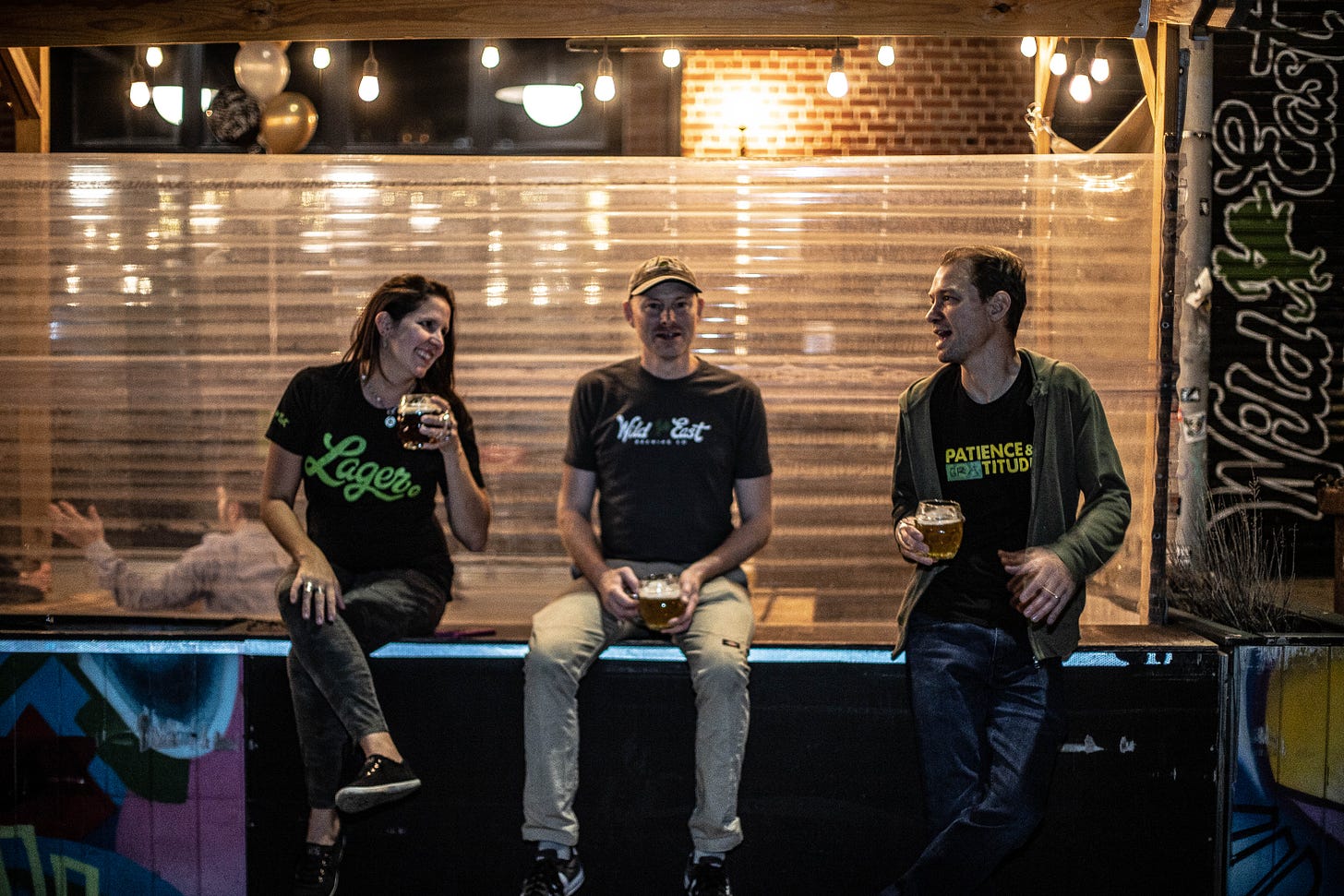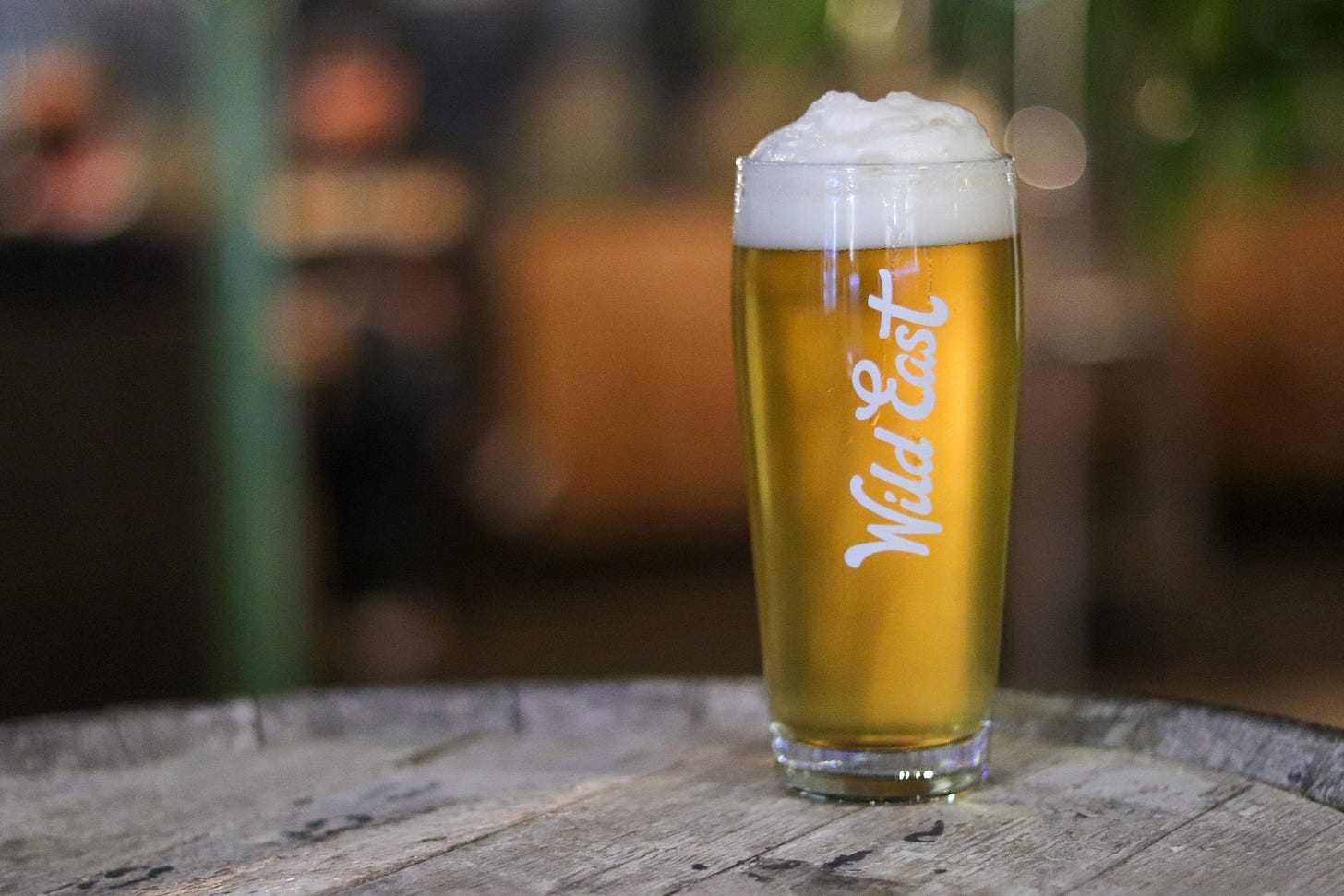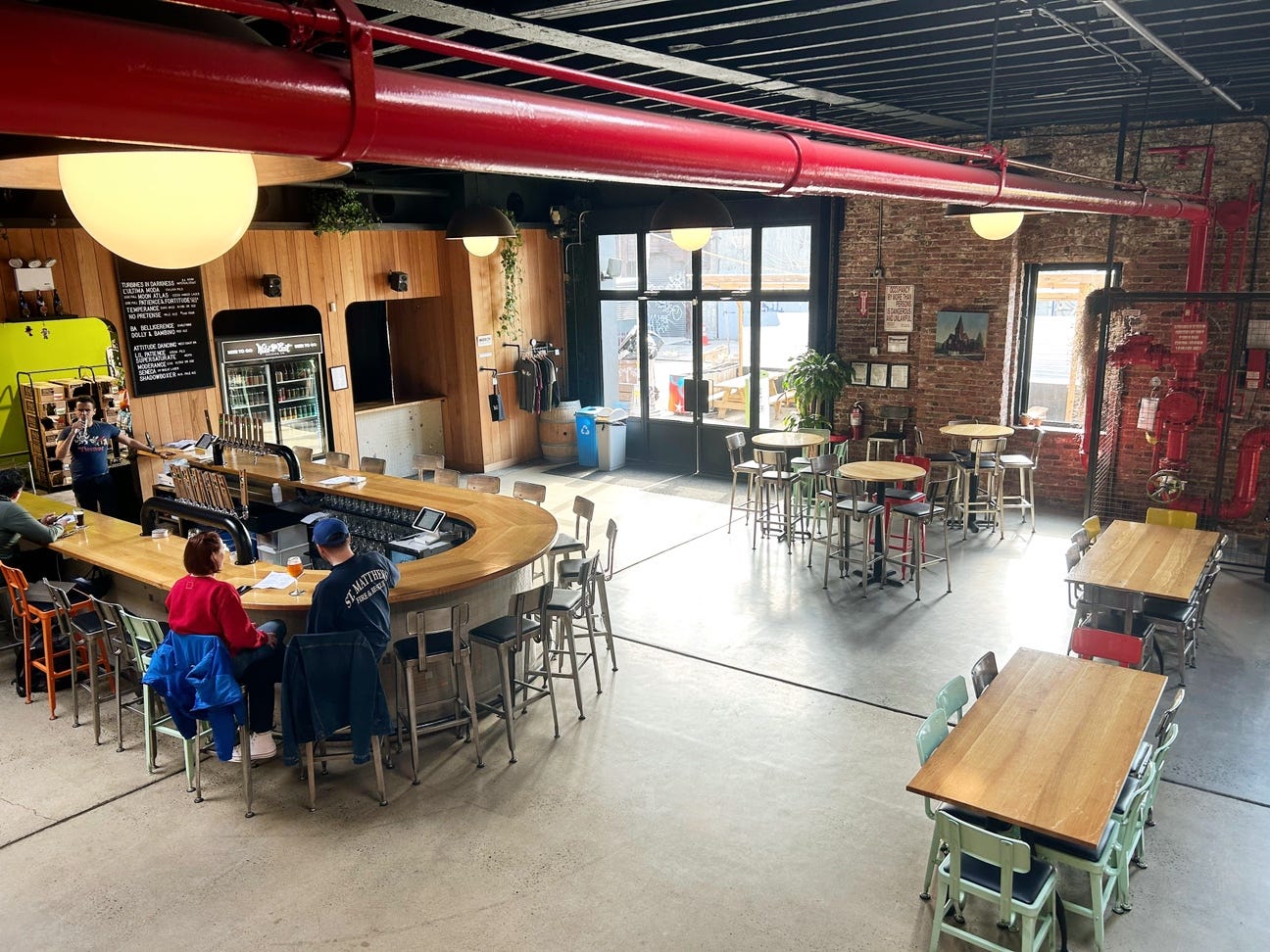Prost Profiles: Wild East Brewing co-founders Tyler March and Brett Taylor
Brooklyn brewery specializes in mixed fermentation and Czech-style lagers. Wild East made its Rochester debut at the recent Rochester Real Beer Expo.
Note: This newsletter is supported by Rohrbach Brewing Co., a pioneering craft brewery in the city of Rochester.
For many the pandemic pause was damaging and detrimental. But for others, it was a time to reevaluate, pivot, and emerge re-energized.
Faced with uncertainty and rapidly changing business conditions, breweries were forced to be nimble. It was the only way to survive. But Brooklyn-based Wild East Brewing, which opened just months before the pandemic started, utilized a different strategy to remain relevant.
Co-founders Brett Taylor, Tyler March, and Lindsay Steen took a decidedly patient approach. The Wild East crew embraced lagers, specifically Czech styles, and mixed fermentation creations. It’s probably why the brewery’s flagship Czech Pilsner is called Patience + Fortitude. Wild East poured for the first time at the Rochester Real Beer Expo earlier this month.
Photo: Wild East co-founders Brett Taylor, Tyler March, and Lindsay Steen. Photo courtesy of Jose Manchola.
“Rochester is a great market,” Taylor said. “We’re just scratching the surface ourselves with our distribution up there. The more western part of New York is just beer country. Every time I am up there, there are a lot of bars and a growing brewery scene.”
“We love going places and meeting people we don’t normally get to meet,” March added. “We try to go to as many festivals as makes sense and festivals we’re excited about, especially a lot of the New York festivals.”
I was lucky enough to link up with Taylor, the head brewer, and March, the head of operations, last month for a chat about the origin of Wild East, embracing a patient approach, and what drives them to produce classic-style beers. (Mea culpa: I was supposed to publish this in the run up to the Expo but just got too busy with planning and logistics. So I am sharing it now, because it was a fascinating chat and I was so ecstatic Wild East came upstate to hang out with us. I can’t wait to host them next year.)
Here are some highlights from our talk:
Q: Can you give me a brief history of Wild East? I remember first hearing about you from my buddy Chris O’Leary (of Brew York fame, who writes the excellent NYC-centric beer newsletter of the same name). I remember him buzzing about your place and that showcases why I’m even more excited to have you in Rochester.
(Note: This interview was completed before the Rochester Real Beer Expo, where Wild East poured and brought some truly amazing stuff. Hope to host them again next year.)
Brett: It started with my homebrewing. I knew Tyler from that. We were part of the same community down here. I started writing a business plan, because I wanted to change careers — out of journalism. I wanted to pursue a brewing career and open a brewery. I was making these mixed fermentation beers at home, and Tyler knew what I was up to. He wanted to get involved. And then we started working on a business plan. Then we met Lindsay and she had a lot of the things that we were lacking. She was also a homebrewer. But she has a background in lab work, sales, has an MBA. She re-wrote the business plan and kept a lot of my pretty English major words in there. And with Tyler’s good editing and Lindsay’s good numbers, we were able to raise some money and get our loans.
We spent a long time looking for a space. We finally found one in Gowanus (neighborhood in Brooklyn). We started building out and finally got brewing at the end of December 2019. We had some really, really successful tap takeovers. And as we were getting ready to open a taproom, we ran smack into the (COVID) lockdown.
Q: How did the pandemic impact your business?
Brett: We had to make beer to do something, to earn an income. We thought we would be more IPA heavy than we were. I just wanted to make decocted lagers. We were a brewery no one has ever heard of, so we couldn’t just sell 30 barrels of IPA. We were just down the street from two of the most noteworthy IPA breweries on the East Coast, if not the world. It was not a good place to be if you wanted to try to follow everybody else. So we filled a lot of barrels and knocked out 30 barrel batches of lager. We would do 10 barrels at a time and just let it sit in a brite tank. We just kept on making more and more lagers. Our water being similar to Czech water, we went down that path. A lot of people make German-style lager. But we make double decocted Czech-style lager. So it’s a good way to differentiate ourselves. There have really been a lot of pivots along the way. Mixed fermentation saison has been a constant all the way through. We just got our cask engine installed. Our English program has been accidentally something we’ve had since the beginning. We started with a dark mild, because it’s a nice thing to have around the holiday season. We’ve kept it around and we’ve expanded it. We now have five or six English-style beers in rotation. And we’re having a lot of fun with the West Coast IPAs. They sell really well for us. We sort of stumbled around and found our way.
Q: You really used the pandemic as a way to be more nimble. Is that something you’ve taken pride in or something you’ve noticed?
Tyler: We really didn’t have a choice. It was a disadvantage and also an advantage to be coming from an unknown place as the pandemic hit. You had a lot of breweries who spent years developing who they were and became known for IPAs or other styles of beer. Because people had an idea of what we were going to be, we had a little bit of flexibility. We hadn’t quite made a name for ourselves yet and we hadn’t quite got our beer into the hands we planned on getting it to. We’ve always stuck to our core vision — mixed fermentation, lager, and some IPAs. There were a few variables that allowed us to try some things we were excited about, stuff we hadn’t seen much in the market. It’s a little scary when you realize there aren’t any dark milds or ESBs in the market. You don’t know if that’s because no one is drinking them or nobody’s making them. A lot of styles we care about, it was apparent people were ready for something different. People come in and tell us it’s refreshing to see 12 different styles of beer. We came in at the right time to do that. If it had been a year or two earlier, we wouldn’t have as much flexibility.
Q: Where did the brewery name come from?
Tyler: The brewery name was a long road, and we’re happy with where we landed. It turns out almost every brewery name is taken. I feel like it’s becoming that way with beer names. We had a long list, hundreds of names that we were either lukewarm on or liked and then found out we couldn’t get the trademark. We went back to the list. Wild East was one of the early names we had that surprisingly wasn’t taken and did stick with us. Wild East is a play on “wild yeast,” because a big part of our brewery is our mixed fermentation program. There’s that aspect. In my head, there’s kind of an association with “wild west.” The current American beer scene is still at a pretty young stage. There’s still a lot of room to explore and do new things. And then there’s the East and a lot of our inspiration comes from European traditions and brewing processes. We’re American. So we like to call ourselves a coalescence of European tradition and modern American innovation.
Title sponsor: Rohrbach Brewing Co.
This work is made possible through support from Rohrbach Brewing Co. Rohrbach features two locations — its Beer Hall at 97 Railroad St. in the city of Rochester and its brewpub at 3859 Buffalo Road in the town of Ogden. Since 1991, Rohrbach has been producing classics and influencing the Rochester beer scene, including its iconic Scotch Ale.
The brewery’s support allows this work to remain free for this audience. So make sure to get out to Rohrbach and support one of the best establishments in our area.
I remain open to sponsorships, sponsored content, and advertisements, especially if it’ll keep the newsletter free for readers. And if you have information about upcoming releases, events, or happenings, don’t hesitate to reach out. For more information, feel free to drop me a line at clevelandprost@gmail.com.
And if you enjoyed this edition of the Cleveland Prost, please subscribe and share! See you again soon.







